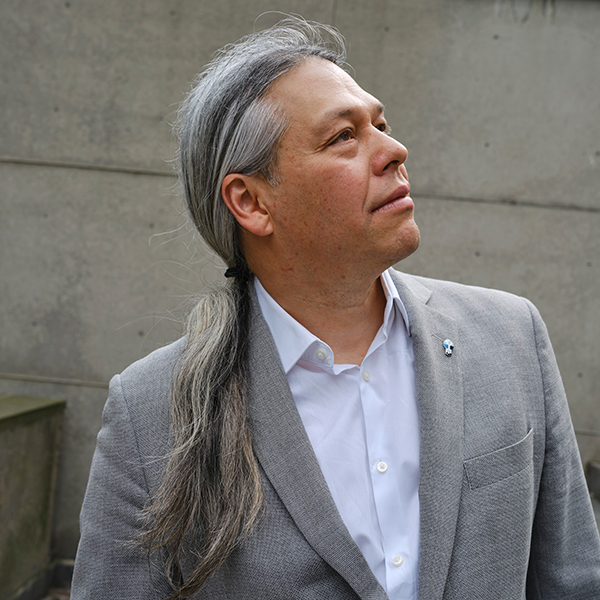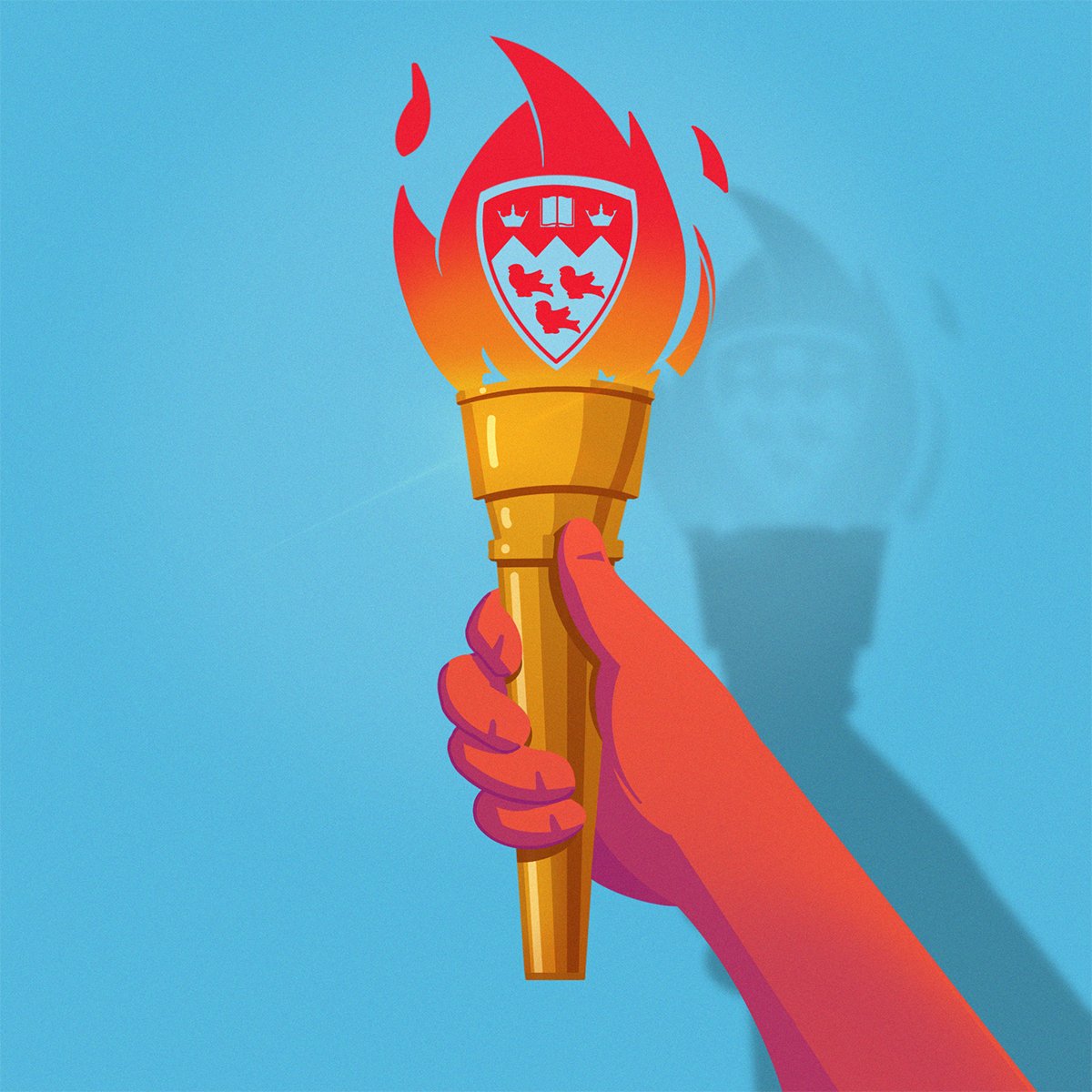Earlier this summer, the Canadian Historical Association held its annual meeting at McGill and Ned Blackhawk, BA’92, gave the keynote address. It was a bit of a coup for the CHA, as Blackhawk, a professor of history and American studies at Yale University, is undeniably a rising star in academic circles right now.
One of his former teachers at McGill, Leonard Moore, a recently retired professor of American history, introduced Blackhawk to the audience.
“I remember Ned sitting at the back of the class, with this look on his face that said, ‘I’m questioning everything you’re saying.’”
Blackhawk, a member of the Te-Moak tribe of Western Shoshone, never stopped asking questions.
As a McGill student, he asked, why was it acceptable for the University’s football team to use a caricature of an angry Indigenous man in a headdress, an image that was profoundly offensive to him and other Indigenous people, on its football helmets and in its promotional materials? Blackhawk was a key figure in the successful student-led campaign to have that image removed.
As a scholar of Native American history who has been teaching since 1999, Blackhawk asked, why were the experiences of Indigenous people so often downplayed, if not outright ignored, whenever a new “serious” tome about U.S. history was published?
One example of that came up during the Q&A portion of his presentation at the CHA meeting – Jill Lepore’s bestseller These Truths: A History of the United States, a book that pays little attention to the role that Indigenous people have played in U.S. history. “How is that possible?” Blackhawk asked.
He decided to write his own book, one that would reexamine the history of his country while highlighting how the experiences of Native Americans are essential to the telling of that story.
The result, published last year, was The Rediscovery of America: Native Peoples and the Unmaking of U.S. History.
“The histories of Indigenous people in North America weren’t just something that happened in the distant past. That history continues to affect us today.”
Ned Blackhawk, author of The Rediscovery of America
The book provides a sweeping narrative, one that covers five centuries. And it builds a convincing case that a proper understanding of how the U.S. has evolved as a country is impossible without thoroughly considering the role that Indigenous people have played in that evolution.
“Encounter – rather than discovery – must structure America’s origins story,” Blackhawk writes in the book’s introduction. When European explorers first arrived on the continent in the 1490s, Indigenous people were already there, speaking hundreds of languages and living in a wide range of societies.
Blackhawk begins the book by asking yet another thorny question. “How can a nation founded on the homelands of dispossessed Indigenous peoples be the world’s most exemplary democracy?”
He spotlights how portions of the country’s foundational documents, the Declaration of Independence and the U.S. Constitution, were written in direct response to the presence of Native Americans – in some cases fundamentally affecting the division of powers between states and the federal government.
He also draws attention to one of the less heralded – and less savoury – motivating factors behind the American Revolutionary War. The revolt against British rule wasn’t just fueled by ire over taxation without representation.
Some settlers interested in expanding their territory wanted the freedom to use violence “against the same Indian communities that British leaders wanted to secure as partners and allies,” writes Blackhawk. The British were in their way.
Causing a stir
Blackhawk was hoping his book would have an impact, but he was caught off guard by the amount of attention it continues to receive.
“It has all been a little overwhelming,” he says.
Esquire described the book as “gripping and nuanced,” adding that “The Rediscovery of America is an essential remedy to the historical record.” It was named one of the best books of 2023 by The New York Times, The New Yorker, Publisher’s Weekly and NPR.
The Rediscovery of America received one of the most coveted book prizes in the U.S., the National Book Award for Nonfiction. More recently, it won the $10,000 Mark Lynton History Prize. Earlier this year, Blackhawk was awarded a Guggenheim Fellowship.
Blackhawk wrote the book, in part, because he believes he would have benefitted had such a resource existed when he was starting out as a scholar.
“It wasn’t just that I wish I had had access to it [when I was younger]. I wish that some of the people teaching me had known these things because then they wouldn’t have taught me the things they taught me.”
At the CHA event, Leonard Moore recalled the conversations he once had with his former student when Blackhawk was first thinking about becoming a historian. “I remember him saying that the profession seemed awfully white to him. I am happy to say that things have changed in that regard and Ned has been at the forefront of that change.”
Clearing the bar
“I had a really formative experience at McGill,” says Blackhawk, who grew up in Detroit.
He had studied French in high school and the thought of going to another country for his university studies held appeal (of course, Canada didn’t seem too foreign – Windsor was only a short drive away). Mostly, he wanted something a little different, something not so close to home. “I just really didn’t want to go to the University of Michigan,” he says with a laugh.
McGill proved to be challenging.
“You had to sink or swim – and I didn’t swim all that fast initially,” says Blackhawk. “There were professors here who held the bar up very high in terms of their expectations. I was able to clear that bar periodically, and when I did, it was incredibly satisfying.
“I had some wonderful teachers here. Len Moore. Catherine LeGrand. I had the opportunity to work with Robert Vogel, a prominent military historian. Gil Troy, an American historian, was famous for his strenuous evaluations. I took some of the poli-sci classes with people like Charles Taylor and Jim Tully. Many of these people were teaching award winners.”
Blackhawk began to think seriously about pursuing an academic career of his own and credits Moore with providing valuable counsel on that front.
‘That history continues to affect us’
His time at McGill and in Montreal affected him in other ways.
The Oka Crisis (also known as the Kanehsatà:ke Resistance) took place in 1990 close to Montreal. A tense 78-day standoff involving Mohawk protesters, Quebec police and the Canadian army, the crisis was sparked by a plan to build a golf course on disputed land that included an Indigenous burial ground.
Watching that event unfold had a profound impact on Blackhawk. “The histories of Indigenous people in North America weren’t just something that happened in the distant past,” he says. “That history continues to affect us today.”
Affronted by the McGill football team’s logo – as a member of McGill’s track team, he couldn’t help but see it often in the University’s athletic facilities – he became one of the leaders of the student protest movement against it, helping to organize teach-ins and a Native Awareness Week.
“The first thing I ever published was an op-ed in the McGill Daily,” says Blackhawk. “It is hard now to even imagine a Canadian school having that kind of representational symbolism.”
Blackhawk maintains ties to his alma mater. In fact, he wrote portions of The Rediscovery of America in the McLennan Library, profiting from the collections built up by Bruce Trigger and other scholars at McGill who studied the history of Indigenous people in North America.
Blackhawk has noticed that Indigenous professors have been added to McGill’s faculty ranks in recent years. “I can remember a time when you could count the number of Indigenous professors at McGill on the fingers of no hands.”
That said, he adds, “McGill has trained dozens upon dozens of Cree teachers in the North. These are things that the institution isn’t always touting.”
Blackhawk has seen the field of Native American studies expand substantially over the course of his career and he credits the existence of The Rediscovery of America, in part, to “this generation of scholars who have all filled in pieces of the puzzle.”
He believes universities can and should do more.
“I’d like to see more administrative commitments from academic leaders,” he says. “Many very major universities in the United States still do not teach anything related to Native American history.”
One of the courses that Blackhawk regularly teaches at Yale, American Indian Law and Policy, has had a powerful impact on some of his own Indigenous students.
“That’s been really gratifying because a lot of these students are not getting that kind of exposure to these subjects anywhere else,” he says. Indigenous leaders and activists in the U.S. have won some important legal victories in recent years regarding territorial and sovereignty issues, says Blackhawk, and some of his students want to be part of that process.
“I’ve somehow taken on this role of helping Native American students get into law school, including many high-ranking law schools. They carry this commitment with them in ways that I find really inspiring.”
His students have access to one important resource that didn’t exist when he was their age. They can consult The Rediscovery of America.



